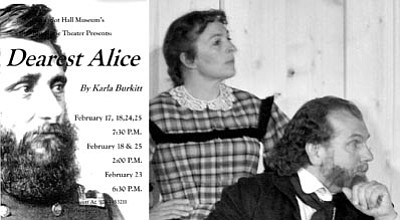By Lane Burkitt
Benjamin Henry Grierson (1826-1911) and Alice Kirk were married on Sept. 24, 1854, in Jacksonville, Ill. At the time, he was a musician and band director and she was a schoolteacher. The Griersons were married during the turbulent pre-Civil War years, and that conflagration shaped much of their lives. He enlisted in the Union Army at the outbreak of the war and was assigned to cavalry duty despite the fact that he had a fear of horses stemming from an incident in which he was kicked and nearly killed by a horse when he was 8 years old.
From his famous military raids across the Confederacy to the exploits of the Buffalo Soldiers of the 10th U.S. Cavalry after the Civil War, the Ben's life was shaped by years of service in the Army. His role in organizing the Buffalo Soldiers, composed of black enlisted men and white officers, made him very unpopular with other officers. His sympathy and courtesy to Native American tribes also led to questions about his judgment. As the white leader of an African-American regiment, Ben Grierson and his family are fascinating figures in the history of U.S. race relations.
Ben and Alice lived and served in many frontier posts in Kansas, Oklahoma, Texas, New Mexico and Arizona and their surviving children grew up in the American West. Col. Grierson's wife, like many other officers' wives, insisted on bringing crateloads of furnishings to make the stay on the frontier more pleasant. They lived at Whipple barracks in Prescott when Col. Grierson was the commander there from the summer of 1885 to late spring of 1886.
One of the things that make this particular couple so intriguing is the volume of correspondence available to the modern reader. In the last few years, Ben Grierson's memoirs and Alice Kirk Grierson's letters have both been published, allowing us to look into the private lives of this couple. The most striking thing about the letters is the fact that so many unflattering letters were saved. Frequent and lengthy separations, disagreements, birth control issues, in-laws, the deaths of three of their seven children and the struggles of two others against mental illness are all captured in poignantly accurate detail.
In Ben's memoirs, we also find a striking racism, even from one who fought and suffered to end slavery and bring an end to inequality based on race. These elements bring a gritty reality to the image of the couple raising them from mere references in history to vibrant individuals with strengths and weaknesses we recognize. They become people who alarm, shock and entertain us, and who in the end we admire. An ordinary middle-class couple, they represent to us today a unique view of a Victorian-era marriage.
For a dramatic interpretation of the lives of Benjamin and Alice Grierson, the Blue Rose Theater at Sharlot Hall Museum will present an original play, "Dearest Alice," written by Karla Burkitt and featuring Karla and Lane Burkitt next weekend. Tickets are $10 ($8 for museum members) in advance and $14 at the door. For dates and times, see the playbill with this article. Stop by or call the museum at 445-3122 for advance seating and tickets.
The following books are available about the Griersons: "A Just and Righteous Cause"; "Benjamin H. Grierson's Civil War Memoir"; "The Colonel's Lady on the Western Frontier"; "The Correspondence of Alice Kirk Grierson"; and "We Were Soldiers."
Note: The role of Col. Marlowe, played by John Wayne in the movie "The Horse Soldiers" is loosely based on Col. Grierson.
The public is encouraged to submit articles for Days Past consideration. Please contact Sharlot Hall Archivist Scott Anderson at 445-3122 for information.
Sharlot Hall Museum/Courtesy photo<br>Karla and Lane Burkitt portray the Griersons in the play “Dearest Alice,” showing next weekend at the Blue Rose Theater at Sharlot Hall Museum.



